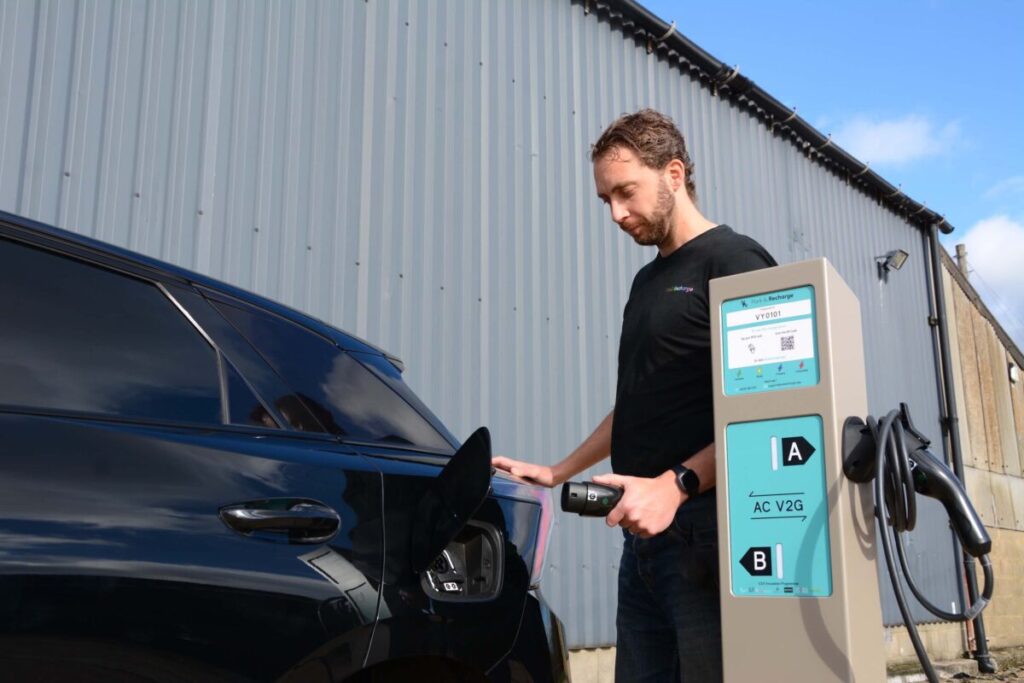From 2026, businesses will be required to track the emissions profile of the electricity used to power an electric vehicle (EV) under the Sustainability Disclosure Requirements (SDR) framework.
The SDR aims to achieve consistent reporting standards on business carbon emissions and UK energy use. This includes the emissions associated with charging EV fleets, whether plugged in on company premises or off-site.
CrowdCharge, an AI-powered technology solution for smart charging that has been facilitating vehicle-to-grid charging for over three years, is offering to enable companies to monitor (and reduce) their EV charging emissions.
The company, which is sister to EV leasing broker DriveElectric, has released data showing that fleets could achieve CO2 savings of up to 63% using its proprietary smart charging software.
The smart charging solution optimises the time at which an EV is charged based on the carbon intensity of the electricity generated by the National Grid, which in turn is influenced by the proportion of renewable energy used.
Mike Potter, CEO of CrowdCharge, said: “Electric vehicles can help individuals, businesses and the UK as a whole to achieve significantly lower carbon emissions, but only if the EVs are charged with low carbon electricity. The challenge is that most organisations don’t know what the carbon emissions are each time an EV is charged.”
The data provided by CrowdCharge, the company says, assists companies in their environmental, social and governance (ESG) journey.
Americo Lenza, CrowdCharge COO, explained: “Our AI-driven software measures the carbon emissions involved in charging, and optimises charging to achieve the lowest possible carbon footprint, so ensuring that electric vehicles have significantly lower real-world carbon emissions than petrol vehicles.”
New SDR mandates are intended to improve the trust in, and transparency of, sustainable investment products and minimise greenwashing. The system is overseen and enforced by the Financial Conduct Authority (FCA), which, under suggested changes brought forward by government, would soon oversee the ESG ratings process.
Currently, firms that provide ratings on businesses’ ESG performance—and thus have the power to allow firms to access sustainability-focused investment funds—are asked to comply with a voluntary code of conduct.
In August, the HM Treasury stated: “Rachel Reeves has asked the Treasury to respond quickly to an industry consultation on a new regulatory regime for ESG rating providers and bring forward legislation next year.”
With green investment seeing major increases, transparent assessment of financial institutions’ ESG performance is increasingly vital, spotlighting the importance of ensuring that those performing ESG ratings are acting in the best interests of the environment and the public.
As CrowdCharge intends to prove, however, compliance with environmental standards promises cost savings. Smart charging and optimisation enables businesses to better predict and manage usage, saving money and carbon.
The company, along with DriveElectric, is currently leading a V2G trial that aims to demonstrate a commercially viable way for fleet owners, businesses, and EV drivers to save money and reduce the load on the electricity grid at peak times.
The project is part of the V2X Innovation Programme, with funding from DESNZ delivered by Innovate UK. The V2X Innovation Programme is part of the up to £65m Flexibility Innovation Programme, funded from the £1 billion Net Zero Innovation Portfolio.






